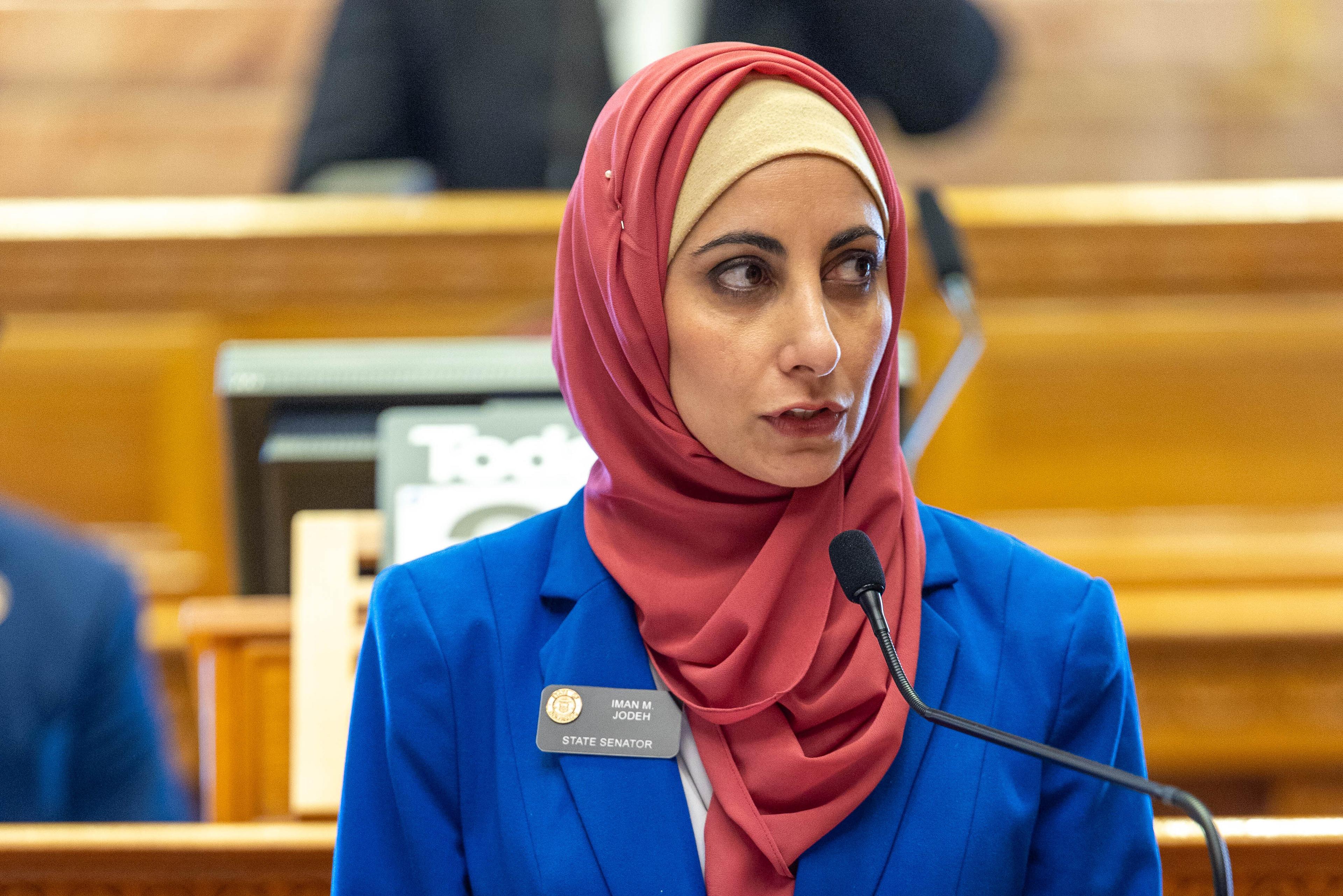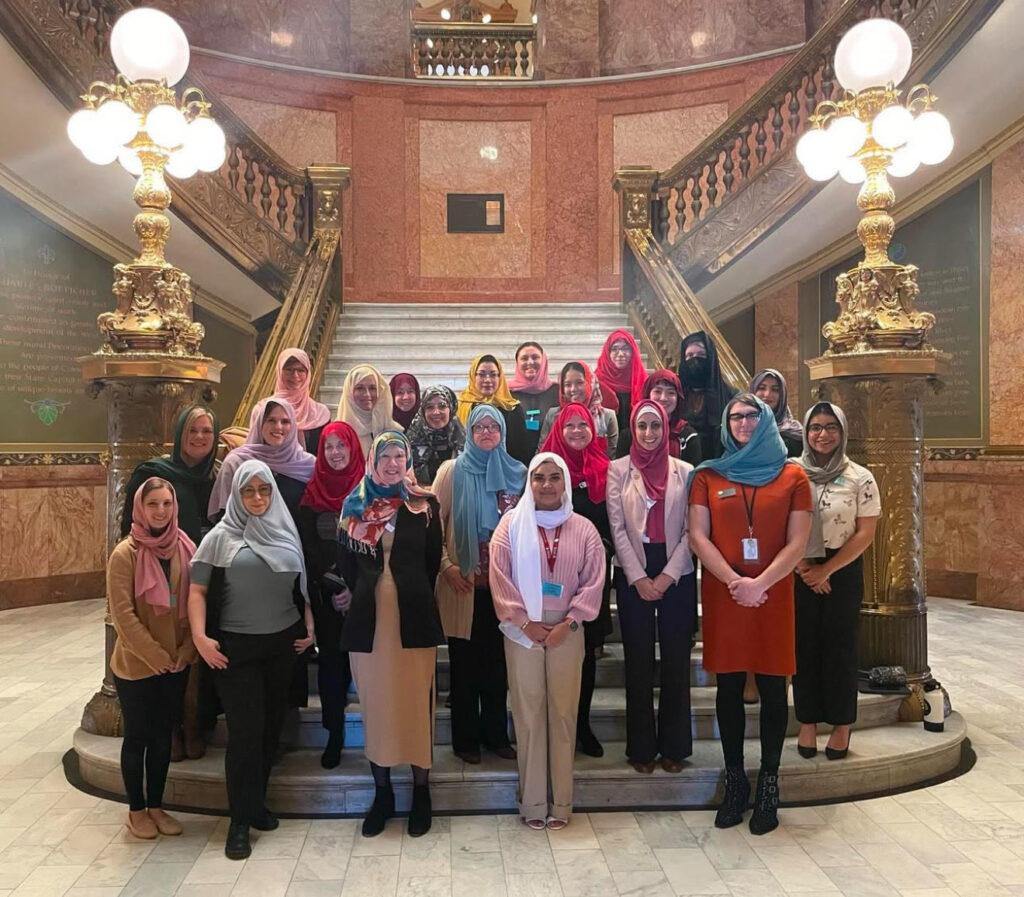
In Honor of Saturday’s World Hijab Day, recognized since 2013, State Sen. Iman Jodeh wore a hijab to the Capitol on Friday and brought in some extra ones for her colleagues to try on.
“I chose to wear the hijab today,” she said in a Google meet from the Senate chamber on Friday, “to uplift Muslim women who wear the hijab and have it as a moment of education.”
The hijab is a scarf wrapped around the head to cover the hair, neck, and ears, the wearing of which many Muslims view as a symbol of modesty and faith.
“I do this every year since I've been in the Legislature and really create a space where people can feel comfortable to ask questions about what it is to wear the hijab,” Jodeh said,
Although she doesn’t usually wear one, she said she might, someday. On Friday, she wore a hijab of two pieces, a beige under-cap of a more nubby fabric, under a pink scarf wrapped with pleats around her head, covering her chest and neck, held in place by pearl-topped pins. The under-cap made it easier for the silky rose fabric to stay in place, because it would be more likely to slip if it was in direct contact with her hair.
Jodeh served four years as a state representative before this year becoming senator, representing about 170,000 people in the southern portion of Aurora, where she said there are five Mosques.
This session, she recently started, along with Iranian-American State Representative Yara Zokaie, an affinity caucus for legislators who self-define as MENASA (Middle Eastern, North African or South Asian) and/or MENA (Middle Eastern North African.
The daughter of Palestinian refugees who was born and raised in Colorado, she said she wanted to use the day as a way to connect people who might have misconceptions around the wearing of a hijab to feel it for themselves.
“Allowing my colleagues to say, ‘Okay, now I feel like I can ask a question safely or honestly, maybe without feeling stupid about asking that question is really what I want to do.”
So she went through her closets and came in with hijabs in addition to the one she was wearing.
“I have brought extra hijabs for non-Muslim legislators and aides and staff to try on and to wear. And it's always been a success. People have always wanted to give it a go and see what it's like.”
She described with excitement a photo taken at the Capitol on Friday of other people trying them on, which was the way the day was intended to be recognized since the initiative was created by a Bangladeshi-New Yorker, Nazma Khan.

She started it “to foster personal freedom of religious expression and cultural understanding by inviting women from all walks of life to experience the hijab for one day on February 1st annually,” according to the organization’s website.
For others at the Capitol, the try-on might be a possible one-time experience, but for Jodeh, it’s much more: “It's not just a piece of fabric. I think it is a reflection of their faith, their identity and self-determination,” she said. “As women, we are able to style our hair, to make ourselves feel beautiful, to attract the opposite sex or anyone that you want to be attracted to you,” she said.
When the hijab enters the equation, she said, things change.
“I think there is a visceral reaction to people who engage with women who wear the hijab – all of a sudden they're not looking at something that makes them beautiful like their hair, but they maybe start to refocus that energy on what's in their heart or what they're saying or what's in their mind... I really choose to wear brighter, more beautiful colors when I wear hijab – things with floral prints. And I don't do that in the sense of I'm forced to wear these colors, but I do it because it makes me feel good, it makes me feel beautiful.”
For Jodeh, finding time to create moments at the Capitol intended to demystify Islam is not limited to hijabs.
“It's just one of multiple things that I do throughout the year to make sure that Muslims are heard and Muslims have a space in the Legislature,” she said.
Besides that, she said: “I provide Ramadan 101 sheets and graphics for all legislators to use on social media, but also for them to be well-prepared and be better-informed when it comes to engaging with their constituents during Ramadan.”









